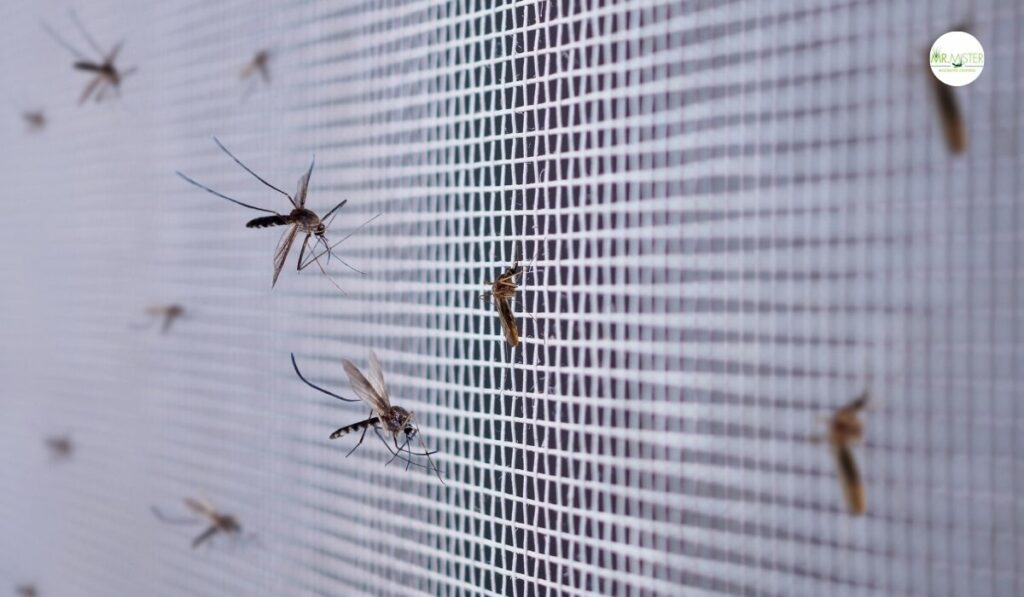Creating a Bee-Friendly Garden: Plants That Repel Mosquitoes Naturally
A harmonious garden not only beautifies your surroundings but also plays a crucial role in supporting local ecosystems.
When designing a garden, especially in urban areas where green spaces are vital for biodiversity, one must consider both aesthetic appeal and environmental impact.
One innovative approach is to cultivate plants that not only attract beneficial pollinators like bees but also naturally repel mosquitoes.
Why Focus on Bee-Friendly Gardens?
Bees are integral to our ecosystem, responsible for pollinating a significant portion of our food crops and wild plants.
However, their populations face threats from habitat loss, pesticide use, and climate change.
Creating bee-friendly gardens provides these essential pollinators with food sources and safe havens, contributing to their survival and the health of our environment.
Mosquitoes and Natural Repellents
While mosquitoes are essential in their own right as part of various ecosystems, they can also be nuisances and carriers of diseases like malaria and dengue.
Instead of resorting to chemical insecticides that harm beneficial insects and the environment, utilizing plants with natural mosquito-repelling properties offers a sustainable and eco-friendly solution.
Plants That Repel Mosquitoes Naturally
- Lavender (Lavandula spp.): Known for its soothing fragrance, lavender also repels mosquitoes with its strong scent. Plant them in sunny spots with well-drained soil.
- Citronella Grass (Cymbopogon nardus): This grassy plant contains citronella oil, a well-known natural mosquito repellent. It thrives in warm climates and can be grown in pots or directly in the ground.
- Marigolds (Tagetes spp.): These vibrant flowers not only add color to your garden but also repel mosquitoes with their distinctive smell. Plant them around borders or near seating areas.
- Rosemary (Rosmarinus officinalis): A versatile herb in cooking, rosemary also acts as a natural mosquito repellent when placed in garden beds or pots on patios.
- Basil (Ocimum spp.): Another culinary favorite, basil emits a scent that mosquitoes find unpleasant. It grows well in containers or on the ground in warm climates.
- Catnip (Nepeta cataria): While cats love it, mosquitoes detest it. Catnip contains nepetalactone, a compound that repels mosquitoes effectively when planted in sunny areas.
- Peppermint (Mentha × Piperita): In addition to its culinary uses and refreshing aroma, peppermint plants deter mosquitoes. Grow them in moist soil and partial shade.
Designing Your Bee-Friendly, Mosquito-Repellent Garden
To create a practical garden that supports bees while naturally repelling mosquitoes:
- Choose Native Plants: Opt for native species that thrive in your local climate and soil conditions. They require less maintenance and support local wildlife.
- Create Diversity: Include a variety of plants that bloom at different times to provide bees with a continuous food source throughout the growing season.
- Avoid Harmful Chemicals: Refrain from using pesticides and herbicides that can harm bees and other beneficial insects. Instead, rely on natural methods like companion planting and biological pest control.
- Provide Water: Bees and other pollinators need access to water. Include a shallow bird bath or a minor water feature with stones for them to land on and drink safely.
- Maintenance: Regularly prune and weed your garden to maintain plant health and encourage growth. Deadheading flowers also promote continuous blooming.
Benefits of Bee-Friendly Gardens
Bee-friendly gardens go beyond just supporting pollinators; they contribute to the overall health of our ecosystems. Here are some additional benefits:
- Pollination Support: Bees transfer pollen between flowers, enabling plants to reproduce and produce fruits and seeds. This process is vital for agriculture and maintaining natural habitats.
- Enhanced Biodiversity: By attracting bees and other pollinators, your garden can host a diverse array of wildlife, from butterflies to birds, contributing to a balanced and resilient ecosystem.
- Aesthetic Appeal: Bee-friendly plants often feature vibrant colors and attractive blooms, enhancing the visual appeal of your garden. They can create a peaceful and inviting atmosphere for outdoor relaxation.
- Educational Opportunities: Gardens provide excellent learning environments for children and adults alike. Observing bees in action fosters an appreciation for nature and an understanding of ecological principles.
Tips for Maintaining a Bee-Friendly, Mosquito-Repellent Garden
Once you’ve selected your plants and designed your garden, here are some tips to ensure its success:
- Regular Monitoring: Monitor your garden for bee activity and plant health. Look for signs of pests or diseases that could affect your plants.
- Companion Planting: Some plants enhance the growth and flavor of neighboring plants while deterring pests. For example, planting garlic or chives near roses can deter aphids.
- Seasonal Considerations: Plan your garden to bloom throughout the seasons, providing continuous food sources for bees. Incorporate early-blooming spring flowers and late-season blooms for autumn.
- Mulching and Watering: Apply mulch around plants to retain moisture and suppress weeds. Water your garden regularly, especially during dry spells, to support plant growth and flowering.
- Natural Pest Control: Introduce beneficial insects like ladybugs and lacewings to control aphids and other pests without harming bees. Avoid using chemical pesticides that can be harmful to pollinators.
Community and Environmental Impact
By creating a bee-friendly, mosquito-repellent garden, you’re not only benefiting your immediate surroundings but also contributing to broader environmental efforts.
Community gardens, in particular, can serve as hubs for education and collaboration among neighbors interested in sustainable gardening practices.
Conclusion
In conclusion, creating a bee-friendly garden that naturally repels mosquitoes is a rewarding endeavor that combines aesthetics with environmental stewardship.
By choosing the right plants, adopting sustainable gardening practices, and supporting local pollinators, you can enjoy a vibrant garden while contributing positively to biodiversity conservation.
Embrace the beauty and functionality of nature in your backyard, and watch as your garden flourishes with life and color.
For more information on creating sustainable gardens or to explore eco-friendly gardening products, visit us at Mr. Mister Mosquito Control.
Start your journey towards a greener, more bee-friendly garden today!
FAQs
Why Focus on Bee-Friendly Gardens?
Bees are crucial pollinators responsible for a significant portion of our food crops and wild plants. By creating bee-friendly gardens, we provide essential food sources and safe habitats for bees, contributing to their survival and biodiversity.
Why Use Plants That Repel Mosquitoes Naturally?
Instead of chemical insecticides that harm beneficial insects and the environment, plants like lavender, citronella grass, and marigolds naturally repel mosquitoes, offering a sustainable and eco-friendly solution to pest control.
Which Plants Repel Mosquitoes Naturally?
Several plants repel mosquitoes naturally, including:
- Lavender
- Citronella Grass
- Marigolds
- Rosemary
- Basil
- Catnip
- Peppermint
These plants emit scents that mosquitoes find unpleasant, making them ideal for a mosquito-repellent garden.
How to Design a Bee-Friendly, Mosquito-Repellent Garden?
To create a practical garden:
- Choose native plants adapted to your local climate.
- Ensure diversity in plant species to support bees throughout the growing season.
- Avoid harmful chemicals and incorporate natural pest control methods.
- Provide water sources such as bird baths or shallow water features.
- Regular maintenance like pruning and weeding promotes plant health and continuous blooming.
What are the Benefits of Bee-Friendly Gardens?
Bee-friendly gardens:
- Support pollination for agriculture and natural habitats.
- Enhance biodiversity by attracting diverse wildlife.
- Add aesthetic appeal with vibrant blooms.
- Provide educational opportunities for learning about nature and ecology.
How to Maintain a Bee-Friendly, Mosquito-Repellent Garden?
Ensure garden success with these tips:
- Monitor bee activity and plant health regularly.
- Practice companion planting to deter pests naturally.
- Plan for continuous blooming throughout the seasons.
- Mulch and water to support plant growth.
- Use natural pest control methods to avoid harm to pollinators.
What is the Community and Environmental Impact of Bee-Friendly Gardens?
Creating bee-friendly gardens contributes to broader environmental efforts by supporting local ecosystems and promoting sustainable gardening practices. Community gardens foster education and collaboration among neighbors interested in eco-friendly gardening.
Can I Combine Bee-Friendly Plants with Mosquito-Repelling Plants in the Same Garden?
Absolutely! Many bee-friendly plants, such as lavender, marigolds, and rosemary, also double as mosquito repellents. By incorporating these plants, you can create a garden that not only supports pollinators but also helps manage mosquito populations naturally.
How Can I Attract Bees to My Garden?
To attract bees, plant a variety of native flowers that bloom at different times throughout the growing season. Include plants like bee balm, coneflowers, and sunflowers, which provide abundant nectar and pollen.
What Other Wildlife Can Bee-Friendly Gardens Attract?
In addition to bees, bee-friendly gardens attract a diverse array of wildlife, such as butterflies and hummingbirds, and beneficial insects, like ladybugs and hoverflies. These creatures contribute to a healthy and balanced ecosystem.
Are There Any Plants That Both Bees and Humans Can Benefit From?
Yes, plants like basil, rosemary, and mint are not only loved by bees but are also helpful in culinary endeavors. Growing these plants in your garden serves the dual purpose of supporting pollinators and providing fresh herbs for cooking.
How Can I Make My Garden More Educational for Children?
Create labeled sections in your garden to showcase different plants and their benefits for bees and other wildlife. Install bee houses or insect hotels where children can observe solitary bees and other beneficial insects up close.
Can I Grow These Plants in Containers or Small Spaces?
Yes, many of the plants that repel mosquitoes and attract bees can be grown in containers on patios, balconies, or small garden plots. Ensure containers have good drainage and provide adequate sunlight for optimal growth.
What Should I Do if I Encounter Pest Problems in My Bee-Friendly Garden?
Instead of using chemical pesticides, which can harm bees and other beneficial insects, employ natural pest control methods like introducing predatory insects or using homemade remedies such as neem oil or soap spray.
* Schedule a Free Mosquito Control Consultation – 404-941-0720 *
* Guaranteed Results * 100% Biodegradable * Locally Owned







